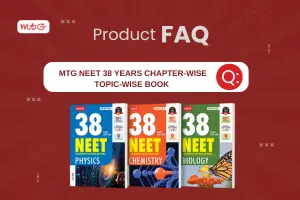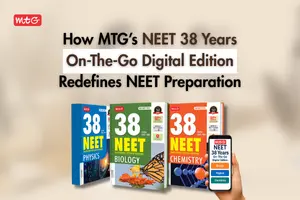NEET is a steep mountain to track on! But once you do it and secure a place in a top medical institution, then you begin to travel on the path of your aspiration to be a Doctor.
The countdown has begun, and it’s only a month left in the examination for the students to make their final preparations and crack the exam on their first attempt. Most of you must be wondering how to manage the final preparations in the most fruitful way to ace the NEET 2026 exam.
No matter when you have started your NEET preparations, these last 30 days, the NEET planner will help you to reserve your seat for the medical courses. This article will help students to deliver their best and utilise these 30 days to score high in the exam. Here is the planner that you must follow sincerely.

PATTERN OF NEET EXAM
The first and most crucial step in the preparation of any examination we take is understanding the syllabus and the pattern of the examination.
As per the latest update in the NEET 2026 exam pattern, there will be a total of 200 questions, out of which candidates need to answer 180 questions; 45 questions each of Physics, Chemistry, Botany, and Zoology for 4 marks each.
There is also a negative marking of 1 mark for each wrong answer. Thus, you must be careful while answering questions and should avoid doing guesswork in the exam.
According to the latest NEET (UG) test pattern, each subject will be divided into two sections. Section A will have 35 questions, and Section B will have 15 questions, of which candidates can choose to attempt any 10 of them; Internal choice is provided in section B. As a result, the total number of questions and time spent will remain unchanged. All the questions are in the form of MCQs.
Candidates can opt for a Question Paper in any of the 13 languages listed below: English, Hindi, Assamese, Bengali, Gujarati, Malayalam, Kannada, Marathi, Odia, Tamil, Telugu, Urdu, and Punjabi.
IMPORTANCE OF EXAM
Since NEET-UG will be for admission to all medical colleges, the number of aspirants would be over 20 lakhs. They will compete for a few thousand seats. This makes the competition pretty tough and the significance of NEET preparation even more important.
SUPPLEMENT YOUR NCERT
As per the analysis of the last few year’s papers, it is evident that major areas of questions are mostly drawn from NCERT textbooks. We hope by now most of you must have thoroughly revised NCERT. That’s good! But if you are still a little not sure about your grab at NCERT, we suggest the Most Popular Book for the NEET exam – the latest revised edition of NCERT at Your Fingertips, which comes in the variant of Physics, Chemistry, and Biology. Recommended by many teachers, students, and toppers, this book is considered as the #1 book for the NEET Preparation on Amazon.
One should also keep in mind that the NEET syllabus is prepared after reviewing various states’ curriculum. It is monitored by the Council Board of School Education, the Central Board of School Education (CBSE), and the National Council of Education Research and Training (NCERT). So, you need to stretch your limits and do the additional questions too – like additional Model Tests, Chapter tests, and NEET previous years papers.
NEET Chapterwise/ Unitwise weightage of each Subject
NEET syllabus is vast and to cover it in a mere 30 days, you need a smart study pattern. You need to get familiar with the exam pattern and focus on the units from which maximum questions appear in the exam. We have done the analysis after reviewing the past three years’ papers, which shows that the following chapters are most frequently used to derive questions for the NEET exam, Check our NEET updated Syllabus 2026 article to know more in details.
30 Days NEET Planner Schedule
| Days | Physics | Chemistry | Biology |
| Day 1 | Physical World and Measurement | Some Basic Concept of Chemistry | The Living and World Biological Classification |
| Day 2 | Motion in a Straight Line | Structure of Atom | Plant Kingdom |
| Day 3 | Motion in a Plane | Classification of Elements & Periodicity in Properties | Animal Kingdom |
| Day 4 | Laws of Motion | Chemical Bonding and Molecular Structure | Morphology and Anatomy of Flowering Plants |
| Day 5 | Work, Energy, and Power | States of Matter (Gases and Liquids) | Structural Organization in Animals |
| Day 6 | System of Particles and Rotational Motion | Thermodynamics | Cell and its Structural Components |
| Day 7 | Gravitation | Equilibrium | Cell Cycle and Cell division |
| Day 8 | Mechanical Properties of Solids | Redox Reactions | Transports in Plants |
| UNIT TEST 1 | UNIT TEST 1 | UNIT TEST 1 | |
| Day 9 | Mechanical Properties of Fluids | Hydrogen | Mineral Nutrition |
| Day 10 | Thermal Properties of Matter | The s-Block Elements | Photosynthesis in Higher Plants |
| Day 11 | Thermodynamics | The p-Block Elements (Group 13 and 14) | Respiration in Plants |
| Day 12 | Kinetic Theory | Organic Chemistry – Some Basic Principles and Techniques | Plant Growth and Development |
| – | – | UNIT TEST 2 | |
| Day 13 | Oscillations | Hydrocarbons | Digestion and Absorption |
| Day 14 | Waves | Environmental Chemistry | Breathing and Exchange of Gases |
| UNIT TEST 2 | UNIT TEST 2 | – | |
| Day 15 | Electric Charges and Fields | Solid State | Body Fluids and Circulation |
| Day 16 | Electrostatic Potential and Capacitance | Solutions | Excretory Products and their elimination |
| Day 17 | Current Electricity | Electrochemistry | Locomotion and Movement |
| Day 18 | Moving Charges and Magnetism | Chemical Kinetics | Neural Control and Coordination |
| Day 19 | Magnetism and Matter | Surface Chemistry | Chemical Coordination and Integration |
| UNIT TEST 3 | UNIT TEST 3 | UNIT TEST 3 | |
| Day 20 | Electromagnetic Induction | General Principle and Processes of Isolation of Elements | Reproduction in Organisms |
| Day 21 | Alternating Current | The p-Block Elements (Group 15 to 18) | Sexual Reproduction in Flowering Plants |
| Day 22 | Electromagnetic Waves | The d- and f-Block Elements | Human Reproduction and Reproductive Health |
| Day 23 | Ray Optics and Optical Instruments | Coordination Compounds | Genetics |
| – | UNIT TEST 4 | – | |
| Day 24 | Wave Optics | Haloalkanes and Haloarenes | Evolution |
| UNIT TEST 4 | – | UNIT TEST 4 | |
| Day 25 | Dual Nature of Radiation and Matter | Alcohols, Phenols and Ethers | Human Health and Diseases |
| Day 26 | Atoms | Aldehydes, Ketones and Carboxylic Acids | Biology in Human Welfare |
| Day 27 | Nuclei | Organic Compounds Containing Nitrogen | Biotechnology |
| Day 28 | Semiconductor Electronics | Biomolecules | Ecosystem and Population Interactions |
| Day 29 | Communication Systems | Polymers | Biodiversity and Conservation |
| Day 30 | Mock Test Papers | Chemistry in Everyday Life | Environmental Issues |
| UNIT TEST 5 | UNIT TEST 5 | UNIT TEST 5 |
Do not try in the last few days to start any new topic, continue with regular breaks. Don’t overstress yourself,eat and hydrate well, sleep properly (4-5 hours at least) a day before the examination, because sleep deprivation can harm your health and may impact your performance in the examination.
Must Read: – How to improve NEET score by practicing Mock Tests
MTG wishes you good luck to accomplish NEET.































Important books for neet and aipmt
bio- ncert
phy-sc verma
chem-op tondon,boris and johnsan
How to get 450+ in neet exam in 40 days??
This post has been extremely helpful to me. Thank you.
Its really helpful and informative
I AM PREPARING FOR NEET2021. I GOT NO TUTION . BUT STILL GOT FULL MARK IN PUBLIC EXAM. I MEAN 12TH.NOW IT’S TIME FOR NEET AND ONLY ONE MONTH LEFT FOR ME. FELT SO BAD THAT “CAN I CRACK THIS” GOT INSPIRATION THROUGH GOOGLE BUT STILL CONFUSED. SEEING THIS 30 DAYS PLANNER IS A RELIEF AND I AM GONNA USE THIS ONE. HOPE TO GET GOOD MARKS IN THIS EXAMINATION. THANKYOU FOR THE HELP
This is very informative post, gives a confidence to NEET aspirants in facing question paper. Thank you for sharing NEET books.I will share this to others also.
It’s a great strategy and thankyou for this planner
Thank u for your suggestion for the exams. It was so helpful.